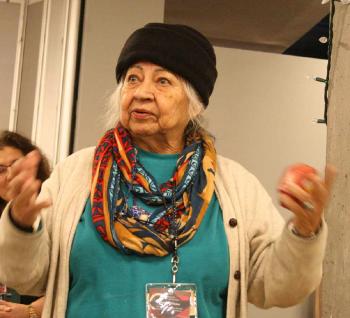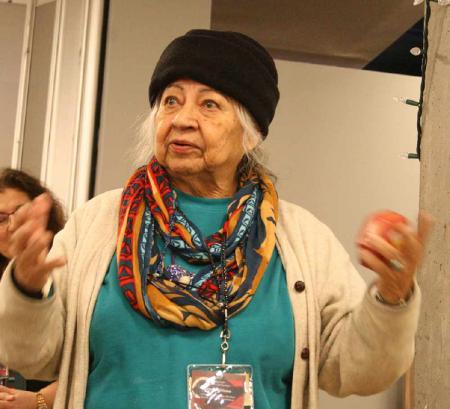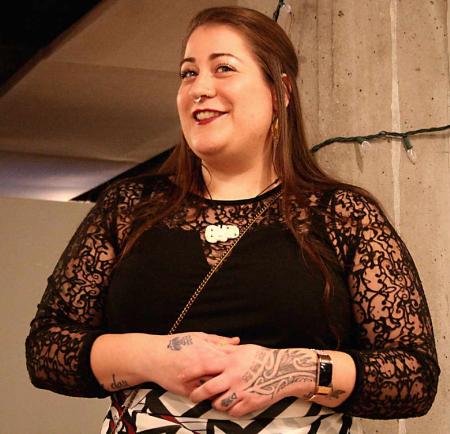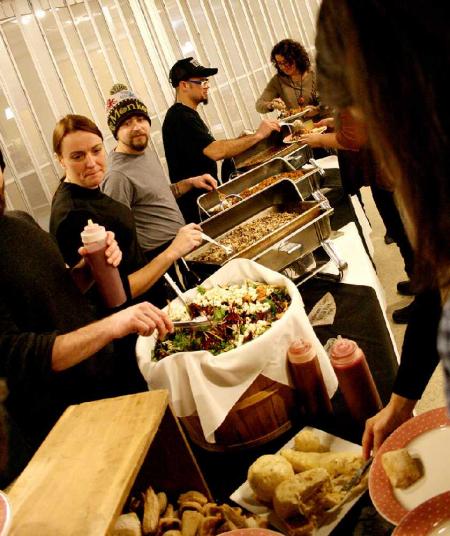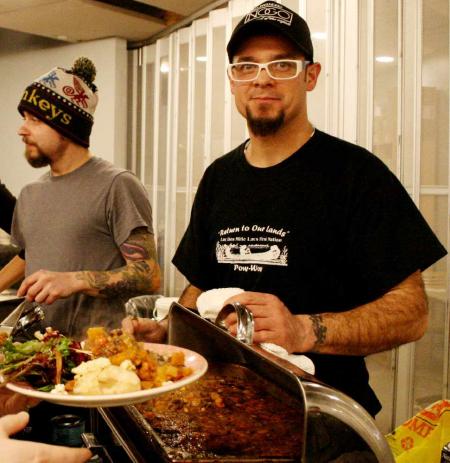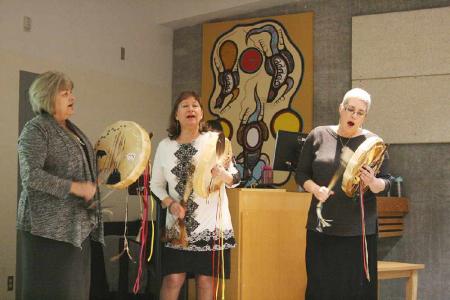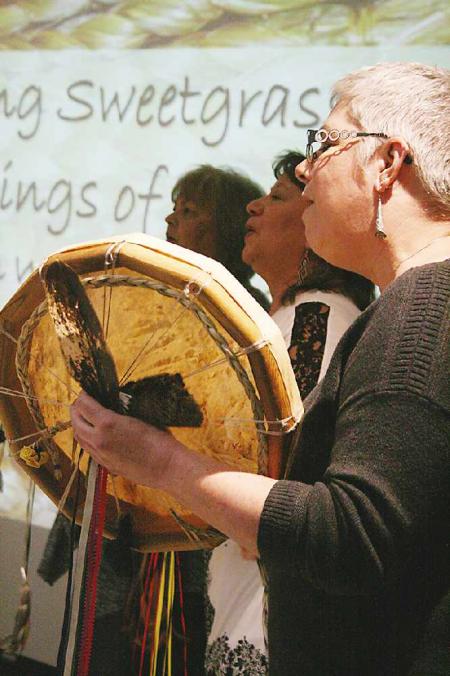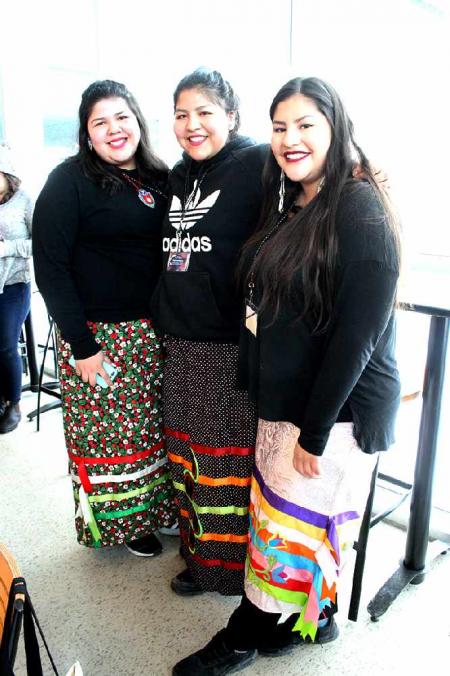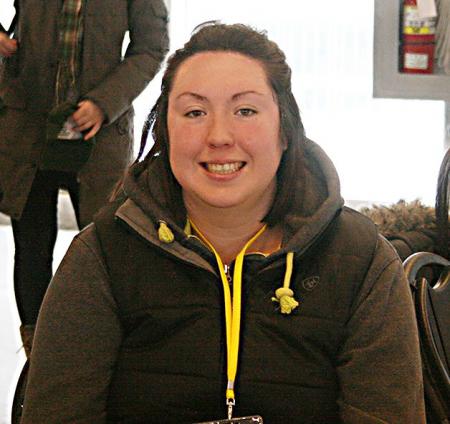Image Caption
{ALBUM_998727}
By Deb Steel
Windspeaker.com Writer
The Indigenous Women’s Symposium, held Feb. 9 and Feb. 10 at Trent University’s Gzowski College, kicked off with a prayer and a feast.
Despite a heavy snowfall, which caused a fast-footed response from organizers to delays and cancellations of workshops and presentations, the lake effect snow didn’t slow many participants down from attending the event.
Hundreds packed Robinson Dining Hall for Friday evening’s dinner where Chef Shawn Adler of the Flying Chestnut Kitchen and his team served up smoked Bison and three sister stews, baked bannock with maple butter, and apple crumble.
Introduced by planning committee member Nahannee-fé Schuitemaker, Elder Shirley Williams provided the prayer and the welcome.
Williams said the Creator had given us all our own tongues and she used her language to pray for blessings over the gathering.
The theme of this year’s sold out event was Articulating Indigenous Identities across the Seven Generations.
After the dinner and some visiting with old friends and making time for some new acquaintances, the participants moved from the dining hall into a plenary session with keynote speaker Robin Wall Kimmerer, botanist, distinguished teaching professor and director at the Center for Native Peoples and the Environment in New York.
Calling for the people to gather for the session was the performance of a couple of songs by Unity drum group, which Schuitemaker joked was the Trent University house band.
Because the bad weather had closed down Highway 81 in upstate New York, Kimmerer’s presentation was made by video link. Her talk focused on respect and reciprocity with plant life and the land, the often difficult time reconciling the Indigenous worldview with the academic and scientific worldviews, and plants as persons, not objects but subjects. (Watch for the story on her presentation coming soon to Windspeaker.com).
Wall was introduced by her sister Barb Wall, who was herself a presenter on Day Two of the symposium. A sunrise ceremony began the sessions the next day.
Inside the college was a vendors’ area where participants could shop for everything from beadworks to make-up.
Morning sessions included a wide variety of workshops for both youth and adults. One session was to include a horse at the school for a youth project called Equestrian (Horse) Teachings. But Sarah Whetung (Curve Lake First Nation) of Canadian Frost Farm decided to leave the horse behind because of the bad weather. But she did make her presentation with the aid of handouts and videos.
It was soon made obvious that the social work student, enrolled at Trent, was deeply committed to her horses and her growing horse knowledge over the many years of horse ownership and hunter/jumper shows. Her goal is to open up an Aboriginal Equine program for at-risk youth.
Horses have no judgement or no voice, she told Windspeaker.com. Young people who find it difficult to find someone to speak to where they feel safe can always whisper in the ear of a horse and it would never betray a confidence.
She has worked with at-risk youth, those who have experienced violence and family dysfunction in their lives, and taught them, with the aid of her horses, to trust again and bond with a living being.
Lunch that day was also provided by Chef Adler, who provided a variety of quiches, a smoked salmon platter and bagels and cream cheeses.
The afternoon keynote was provided by Rebecca Thomas, Slam poet, who spoke about the iterations of Indigenous identity while sharing her poetry. See our story here: http://www.windspeaker.com/news/windspeaker-news/indigeneity-who-has-claimed-you-back/
The Indigenous Women’s Symposium is an annual event. It is the legacy of Elder Edna Manitowabi, who retired in 2004 from Trent U where she taught, researched and developed courses in Aboriginal Theatre, Aboriginal Women’s Studies, and Indigenous Knowledge, and Culture and Community. She is an Anishinabek knowledge holder, traditional singer, storyteller and performer originally from Wikwemikong Unceded Indian Reserve.
As a long-time advocate, she wanted to celebrate Indigenous women, so initiated the symposium in the early 2000s.

